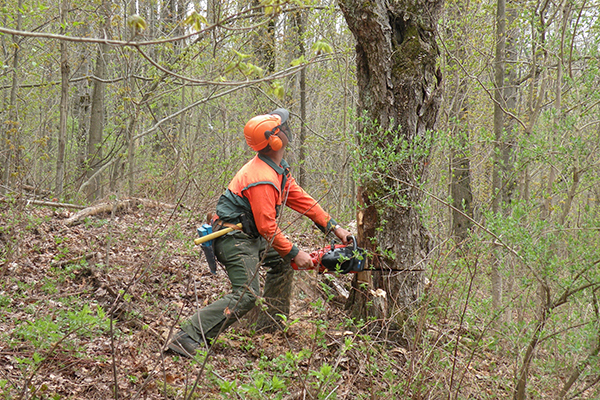Arborists specialize in individual tree care, often in urban or suburban settings. Foresters use tree measurements, landowner goals, and knowledge of forests to develop plans to care for your woods over time. And loggers are the boots on the ground carrying out the plan you and your forester developed.
You can DIY a lot in your woods, but for the really big stuff, like harvesting timber, it’s useful to get professional help. But what pros are you looking for, and where can you find them?
When it comes to trees, you’ll see three job titles most often: forester, logger, and arborist. These titles might sound similar, but they have very different educational backgrounds, skills, and services.
Arborists
Let’s start with arborists. Arborists focus on individual trees like those in your lawn, which is why you’ll often see them described as “tree care” or “tree service” professionals. If you’re having the maple in your backyard pruned, or the dying ash near the road taken down, you’re most likely hiring an arborist to do that work.

Arborists specialize in individual tree care, often in urban or suburban settings. They routinely have to climb trees and bring them down in parts to avoid hitting powerlines, buildings, and other obstacles.
Now I’ve seen arborists at work, and let me tell you, it’s impressive stuff. I’d go so far as to call it an art form. For projects in your woods, though, arborists generally won’t be your first choice. When you move beyond individual trees and start dealing with acres of them, now the pros you should be looking for are foresters and loggers.
FORESTERS
What’s the difference between foresters and loggers? Let’s explain it with an analogy. Say you’re having a house built. An architect draws up the plans for what the house should look like. Then the construction team uses those plans to build the house you want.
Foresters are like architects for the woods. College-trained, usually with a bachelor’s degree in forestry, foresters develop a plan for how to care for each section of woods on your land. They base that plan on what you own and what you want. Do you want to grow high-value timber? Do you want to attract certain species of wildlife? Maybe you have a mix of things you’d like to see and do in your woods. Foresters have the knowledge to work with what your land has to move it toward what you’d like it to be. If that plan includes harvesting timber, your forester will oversee the sale, helping attract reputable buyers and then making sure the terms of the sale contract are carried out.

Foresters use tree measurements, landowner goals, and knowledge of how forests grow and respond to change to develop plans to care for your woods over time. They also oversee timber harvests to ensure that contract terms are carried out.
LOGGERS
If foresters are the architects, loggers are the construction team. They’re the boots on the ground carrying out the plan you and your forester developed. Their focus is on safe, efficient removal of trees from your woods. They’re also the ones usually doing any trail work needed as part of a timber harvest, such as installing Best Management Practices (BMPs) to keep trails stable and protect streams.
Learn more about Forestry BMPs with these MyWoodlot resources
Loggers focus on the safe, efficient removal of trees from the woods. If you’re having a professional do on-the-ground work in your woods, a logger is likely who you’ll be working with.
So how do you find these professionals? For arborists, check out this searchable database from the International Society of Arboriculture. For foresters, check out our Hire a Forester activity, which includes lists for New York State as well as tips on how to find a forester who will be a good fit for you. For loggers, look for those with third-party certification (in New York, look for TLC, or Trained Logger Certified loggers). Certified loggers have taken the time to get continuing education in safety and environmental stewardship, so by working with them, you’re more likely to get a higher quality professional. Here’s a link to a list of TLC loggers we’ve worked with on projects in the last three years.






